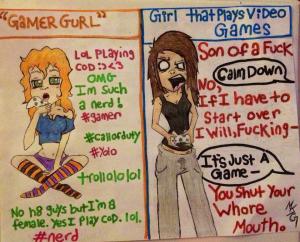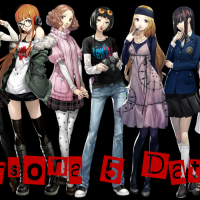Cringe. Life of a Gamer Girl. What does it even matter that I’m a girl? It shouldn’t matter. And yet it does.
Like many of my fellow gamers, I started playing games when I was really young. The story, as my dad tells it, is that my mom needed to go back to Vietnam for a week to visit her mother in the hospital. Apparently, to distract me and keep my 4-year-old self from crying the entire time, he got me to play games with him (my dad is not a gamer). My first game ever was Contra. I was always the orange character. And yes, I learned the Konami code when I was 4.

I first encountered…gamer girl problems when I was in elementary school. My family got an N64, and I got really good at Starfox 64. My guy friends at school would talk about it, ask each other how far they’d gotten or whether they’d found a new secret, and the usual stuff. However, I was never really allowed to chime in on how I’d beaten the game on hard route, or when I unlocked expert mode, or so on. This frustrated me. It was gratifying when I picked up a controller and bodied my guy friends in game, but then they no longer wanted to let me play.
Much of my life was like this. When I was at my friends’ apartment playing Street Fighter 4 in college, surrounded by guys, and I repeatedly pulled out the Akuma super on one friend whom I’d never played with before, he asked, “How the fuck does she keep getting that?” My other friend said, “Because she’s [bobaandgames], that’s why,” as if to say not to take me lightly, to say that I play on par with the skill level of my guy friends, and to think that I’m scrubby because of my gender would be a mistake.
Eventually, as games took off online, I started to play online competitive games as well. Many times, people are good and normal. Guys are admittedly a little shocked to find out that I’m a girl, but they’re usually okay with it and treat me with respect and friendship. Then there are other times, where guys really do play into the stereotypical image of discriminating against girl gamers. It can be obvious things like saying that my performance is subpar, but in reality it’s because they’re not okay with me playing a DPS class (because girls should heal/support), and the damage stats show that I’m not lacking. It can be more discreet, like when someone is much better than me at a game, but when they beat me they think that I am a girl gamer that is all talk. Why is the reaction different when playing against a guy who is not as good? He doesn’t suddenly lose his credibility as a gamer.

I have played World of Warcraft for a number of years, on and off, throughout my life. No, I do not prefer PvE over PvP. No, I do not main a healer, although I do like the offense-oriented style of healing in a restoration druid. My main character is currently a level 100 frost mage. I am 2k experienced in rated battlegrounds with a group that I climbed ranks with (i.e., they didn’t carry me). My guild has nicknamed me the “CC Queen” because I open opportunities for my teammates to land killing blows by setting up a good CC chain, locking down the opposing team’s defenses.
Some people can’t really get over the fact that I’m a girl who likes to PvP and won’t heal, though.
It’s not a universal thing. My friends list is full of guy friends I have met online who respect and acknowledge my skill. They’re people I have fun with, and I really enjoy playing with them. Some of them know that I am a girl, and others have only chatted with me in text. My best experiences involve playing with friends who acknowledge my skill, follow my lead when it is right to do so, cooperate with me for a strong team game, and criticize me (and receive criticism) when there is something I could do better. However, the discrimination is sometimes there in the public community, and I wish it weren’t.



September 16, 2015 at 7:35 AM
I’m not a video games gamer (if that’s the right saying), but I get what you’re saying. I like war strategy games, so I play them and my friends always go why do you play such, those are boy games and nerd games… even go as far to say playing war games is destructive, are they even for real? SO I get it, but like you said there’s nothing wring with being a girl gamer, embrace what you love and screw whoever doesn’t agree.
LikeLiked by 1 person
September 16, 2015 at 4:49 PM
Well said! I think if you like games, then you like games. There’s nothing really complicated about it. All these people trying to say that some gamers are more “real” than others based on skill, which games they play, or whatever criteria are silly, in my opinion. Why not just embrace the diversity and see what other cool games are out there to try?
LikeLike
September 16, 2015 at 8:02 AM
Thanks for sharing your story and your honesty. I’m not a gamer myself but I’ve read about #Gamergate in Reddit and the news, so your perspective is an interesting one. I hope things do shift and am glad you have a supportive group of friends you can count on. All the best.
LikeLiked by 1 person
September 16, 2015 at 4:56 PM
Gamergate and Reddit both have their fair share of…less impressive moments, but I try not to hold it against the entire community. I do think we’re moving in the right direction, though, and that the people who aren’t adapting will eventually weed themselves out or change. I know I’ve changed a lot of guys’ opinions on girl gamers, so I think it’s just a matter of time :).
LikeLike
September 16, 2015 at 3:49 PM
I love my video games, although I don’t play games to the level, you obviously do. But I remember years ago when I was hanging with my ex and our friends, (quite a few who were male) would be playing video games, they very rarely let me join in with them, because they thought I wasn’t very good. As most video games I played were RPG like Final fantasy and Kingdom hearts. Maria x
LikeLike
September 26, 2015 at 3:20 PM
I can relate to you so much! Luckily, I have been surrounded by supportive guys who don’t care that I like games. In fact, they don’t find it special either:D I’m just they’re friend, and we happen to like video games! The thing I can’t stand though, is when I’ve been harrassed. A few months ago, one of my guy friends asked me to date him.(This has happened before, but with other guys) I politely declined. And ever since then, he won’t stop harassing me to do so. My other guy friends even told him to knock it off, and he soon ditched the group and now hangs out with a group who would bash me for playing games. No, men are not all like this, but it really stinks to think that just because I won’t go out with someone or just because I’m a female, that certain expectations are held for me.
My best girl friend’s thought it was a little weird that I played games but now they accept me. Still, whenever I talk about my hobbies, other people who don’t know me look at me and say “Why don’t you read a book?”
“I love to read, but I also love video games.” Is what I’ll say. And they’ll look at me like I’m some phenomenon. Is it really so weird? Is it weird that I appreciate these things? And then the most annoying thing is when guys complain that girls don’t give games a chance-but as soon as we do, they feel like this is a challenge to their masculinity if they aren’t as good as she in a game or she won’t date him or anything.
LikeLike
September 26, 2015 at 7:00 PM
Ugh, I’ve been there too. Sometimes I feel like my friendships with a group of guys is so fragile because if someone developed and/or acted on their feelings for me that it’d cause problems. In one situation, I was close with a guy and his sister who played games online with me. The guy one day tells me his feelings, and I politely decline. Things were still generally fine until the guy the sister liked ended up liking me too, and I turned him down as well, but he was pretty stubborn about still going after me. Eventually all three of them started to hate me like it was my fault, lol. I feel like I can’t log on that game anymore.
LikeLiked by 1 person
September 26, 2015 at 7:12 PM
Ouch, talk about rough!! I don’t get it-why does stuff have to always turn out this way? Having a platonic friendship between guys and girls is possible but it almost seems like people are too stubborn to realize this and they think one of them has to develop feelings because it just works that way. And then everything gets all awkward. And gosh, that really stinks. I’m really sorry about that but hey, now you know how they really are?
LikeLike
October 9, 2015 at 3:22 PM
It does seem that there are some men that, for whatever reason (a challenge to the status quo, backwards-looking personal beliefs, etc.), cannot accept the idea of a girl liking video games. I don’t think it’s necessarily because they’re misogynistic, but rather they’re jerks – and unimaginative ones at that – who pick on gender because it’s the readily apparent variable (though there is likely real misogyny involved as well). Whatever the case may be, I think the people who insist on perpetuating it know their mentality is in its death throes, and their rantings come not from a sense of dominance, but rather their desperation in staving off the inevitable change.
LikeLike
September 16, 2015 at 5:35 PM
Thanks for the link :). I’m glad you enjoyed the post!
LikeLike